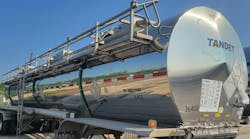With the state of the economy constricting the financial market and some institutions holding loans close to their chests, tank truck carriers may be skeptical about laying out cash for vehicle purchases until they have more confidence in what the future holds for the industry.
Now could be the time for managers to consider a tank trailer leasing program instead of owning vehicles, say leasing industry spokesmen contacted by Bulk Transporter to comment on the advantages of leasing in today's vacillating economy.
“Leasing offers flexibility unavailable in traditional commercial lending,” Ralph Nappi at Transport Resources, points out. “Preservation of capital is critical to all businesses in the current economy.”
Jim Rogers at Matlack Leasing LLC offered a similar viewpoint, noting that many of his customers have historically chosen leasing for a variety of reasons, especially if they wish to avoid certain loan outcomes. “They do not need to tap credit lines or increase their long-term debt obligations,” he says.
At the same time, Kenneth E Bentsen Jr, president of the Equipment Leasing and Finance Association, points out in a news release that the economic environment shouldn't prevent companies from growing as their markets demand. “Equipment leasing is a strategic financial option for businesses to consider regardless of the economic climate,” he stated. “But it is an even more attractive option given the current environment where maintaining cash flow, preserving capital, and obtaining flexible financial solutions are even more critical as businesses ride out the storm.”
Those considerations bode well for today's climate, especially when the forecast is predicting cloudy weather for most crystal balls. That means that flexibility is a key word for tank truck operations — and leasing can be a means to that end.
“Fleet counts can be rebalanced by returning equipment during the lease term, often with little or no penalty.” Nappi says.
“Many will lease short term in case the piece of business they just received does not increase at the rate it was thought,” Rogers says.
Strategic plannning
Uncertainty, negative economic conditions, and deteriorating forecasts are challenges to growing a business, but for those businesses that want to stay competitive, especially during a downward economy, it is critical to be strategic about how equipment is acquired, Bentsen states.
Even in the best times, tank truck carriers may be awarded business that appears solid. Then an unforeseen change occurs, such as a shipper losing a customer and reducing production as a result, Rogers says.
“Leasing allows our customers to put more money into systems, staffing, training, and infrastructure,” Rogers adds. “Many lease ‘specials’ and then tie the term into their contract so that when the lease ends, they do not own units where utilization is less than required.”
When situations do change, one answer for carriers is to diversify by introducing new product transportation to their services. “With the dearth of freight in the present marketplace, leasing affords an excellent way to test new markets, for example acids, dry bulk, chemicals, without drawing on credit lines,” says Nappi.
Key questions
At the same time, Bentsen reminds companies that are considering equipment leasing to ask themselves 10 questions:
-
How will the company be using the equipment?
-
How well does the equipment finance company representative understand the company's business?
-
What are the total lease payments and costs?
-
What happens if the company wants to change or end the lease early?
-
What is the company's responsibility if the equipment is damaged or destroyed?
-
Does the company have any other obligations for the equipment?
-
How can the company upgrade or add equipment under the lease?
-
What are the options at the end of the lease?
-
What procedures must be followed if the company chooses to return the equipment?
-
Are any extra costs incurred at the end of the lease?
“Determine how your company will use the equipment and the length of time it will be needed,” says Bentsen. “This will help determine the appropriate level of investment for a lease.”
He says that typically it is beneficial to work with a companies that understands the carrier's market niche, regardless of the service being sought. “This is even more crucial with regard to leasing,” Bentsen emphasizes.
If a carrier wishes to terminate a lease earlier than originally contracted, it is important to understand the terms of the agreement. “A lease is a contract between two or more parties creating obligations for those parties, thus changes such as terms or length of time requested after signing and not set forth in the original agreement could result in additional payments or charges,” Bentsen states. “On the other hand, a master lease, which controls later leases or subleases is designed to facilitate changes in leasing needs, and is an option that many businesses choose.”
Tax concerns
Another important aspect in understanding a leasing contract is to know the liability, insurance, taxes, and maintenance requirements. “Be sure these conditions are clear and included in your lease agreement, and review these provisions with your equipment finance company representative,” Bentsen states.
Although the economy may be struggling now, businesses may well anticipate growth in the future and should negotiate an option to add equipment under original terms and conditions when structuring a lease program.
Bentsen points out that at the end of the lease, a carrier's options are to return the equipment, purchase the equipment at fair market value or a nominal fixed price, or renew the lease. “Determining the option you will take and specifying it in the original lease agreement is important,” he says. “If you choose to purchase at lease end, ask when you will receive the title.
“The more questions you ask, the more information you will have in order to make an informed decision about lease financing. Knowing the right questions to ask will put you in the strongest position possible as you acquire equipment so that you are able to focus on making strategic use of equipment at a time when businesses need every advantage possible to stay afloat and be competitive.”








